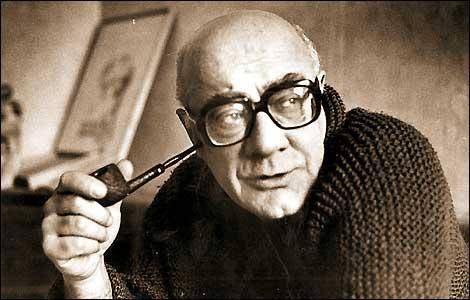
MERAB MAMARDASHVILI (15. 09. 1930, Gori — 25. 11. 1990, Moscow) — Russian philosopher. He was born in Georgia into a military family. His mother belonged to a family of teachers of Georgian crown princes. In 1954 he entered the Department of Philosophy at Moscow University. He defended his Ph.D. thesis in 1970 in Tbilisi (Georgia). He worked in the Institute of Philosophy of the USSR and lectured at Moscow University on Descartes, Kant, and philosophy of science. In 1980 he went to Georgia, where he worked at the Institute of Philosophy and lectured on Proust and phenomenology in University of Tbilisi. For his talent at lecturing he was called the 'Russian Socrates'. He wrote just one book Tractatus on Development of Knowledge, all his other works are collections of his interviews, speeches and talks.
The main theme of his research was the relation between language and consciousness. The latter, according to Mamardashvili, is not a natural human capability, it not only grows up naturally from the environment, but it appears and report on itself in the metaphysical space of language and human co-operation. He considers consciousness to be an act of human existence; he said 'the act of thinking is correlated with Being as a transcendental level of human existence' (Arrow of Cognition p. 23).
Philosophy is not only what one is thinking about, but also how one is existing. 'As far as I understand philosophy — he said — it was always interested in one question: how can one think that, which is thinking?' (How I Understand a Philosophy. — p. 5). Therefore the aim of philosophy is to find and keep the unity of the past, present and future in act of existing. To exist means to be absent in thought, but see the existence of thought as it is; no one idea belongs to a thinker, but a thinker belongs to it. And one should maintain it in one's life. 'Philosophy is not a profession, it is rather temperament and way of life, and I can inform you in no sum of knowledge, I can only pass something very intimate and therefore that must remain obscure' (How I Understand a Philosophy. — p. 338).
-=-
Mamardashvili M., Forms and Content of Thinking. Moscow, 1986;
Mamardashvili M. How I Understand a Philosophy. Moscow, 1992;
Mamardashvili M. Cartesian Meditations. Moscow, 1993;
Mamardashvili M., Classical and Non-classical Ideals of Rationality. Moscow, 1994;
Mamardashvili M., Lectures on Proust. Psychological Topology of the Path. Moscow, 1995;
Mamardashvili M., Arrow of Cognition. Sketches of Natural-Historical Epistemology. M, 1996;
Mamardashvili M., Necessity of the Self. Moscow, 1996;
Mamardashvili M. and Pyatigorski A., Symbol and Cognition. Metaphysical Meditations on Consciousness, Symbolism and Language. Moscow, 1997;
Mamardashvili M., Lectures on Ancient Philosophy. Moscow, 1997;
Mamardashvili M., Aesthetic of Thinking. Moscow, 2000;
-=-
© Dmitry A. Olshansky, M.A. in Philosophy (St. Petersburg)
E-mail: olshansky@hotmail.com
